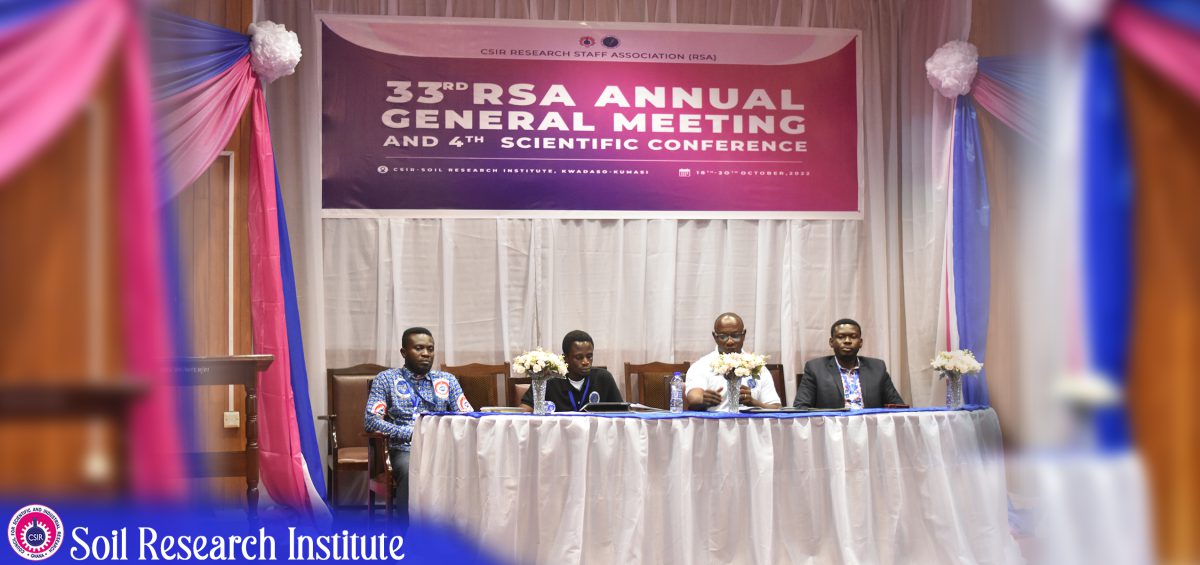CSIR-RSA 33RD AGM AND 4TH SCIENTIFIC CONFERENCE: RESEARCH SCIENTISTS URGED TO DO MORE TO HELP SOCIETY NEEDS-CSIR DIRECTOR.


The Council for Scientific and Industrial Research (CSIR) Research Staff Association (RSA) has
held its 33 rd Annual General Meeting (AGM) and 4th scientific conference with a call on
research scientists to work more to meet the needs of society in the country.
The Conference is an annual gathering of researchers and scientists and research grade staff of
CSIR to provide scientists, researchers, development partners and other stakeholders the
opportunity to seek partnerships, collaborations and networks to develop and/or refine their
research programs.
The 3-day event was on the theme: “Sustainable soil and Environmental Resources Management
for food and Nutritional security “.
Prof. Paul Peter Bosu, Director–General, CSIR in his opening speech, called on research
scientists to prioritize the need to transform their research inputs to drive development and
promote efficiency to yield more economic benefits to Ghanaian society.
The CSIR Director indicated that the conference was expected to receive innovative research
information, networking, and dialogue and to show their contribution to national and
international development.
“As an institution, we need to be at the national front, actively spearheading in finding solutions,
not just doing research, to warm the shelves, but also ones that help and have relevance to the
society”, he added.
Prof. Bosu also commended the government for taking steps to halt illegal mining activities
(Galamsey) adding, it was important for the government to take pragmatic actions to stop these
illegal activities once and for all.
Dr. Kofi Ampomah-Benefo, the national president of the Research Staff Association (RSA)
hoped that by the end of the conference, attendees would be motivated to develop scientific
solutions to address emerging problems in the country.
Dr. Edward Yeboah, director at CSIR-Soil Research Institute (SRI) said the SRI mandate, over
the years and in recent times been involved with a lot of work on soil and environmental
resource management in Ghana for improved food and nutrition security, environmental health
and enhanced livelihoods.
The CSIR-SRI Director mentioned a few of the projects SRI have been running to deliver on
their mandate and in support of the above theme are enumerated below:
Capitalizing on the Inland Valley Potential for Food and Nutrition Security for
Smallholder Farmers in West Africa (CIPA).
Digital Soil Fertility Mapping of 100,000ha Ashanti Region Crop Lands.
Savannah Zone Agricultural Productivity Improvement Project (SAPIP).
Development of Comprehensive Rice Production Technologies and Capacity Building
for Farmers and Extension Officers.
Improving the Effectiveness of Existing Fertilizer Blends for Smallholder Farmers
through the Fertilizer Research and Responsible Implementation (FERRARI) project.
Evaluation of New Poly-4 Crop Specific Fertilizer Blends on Cocoa, Oil Palm &
Maize.
A remote sensing supported framework that incentivizes site-specific agronomic
management of smallholder cocoa farms in Ghana (FRAME – Cocoa).
Notwithstanding, the CSIR – SRI has also been working tirelessly recently and in times past with
both local and international partners. The objectives of these collaborations are to foster
partnerships that seek to create synergies that work to improve soil health, maintain
environmental sanity, tackle climate change, and promote related adaptation and mitigation
strategies.
Various union representatives within the CSIR Institute, including CCCLU, GMA, GEAC-RSA
and CAAG, were called to present their goodwill messages.